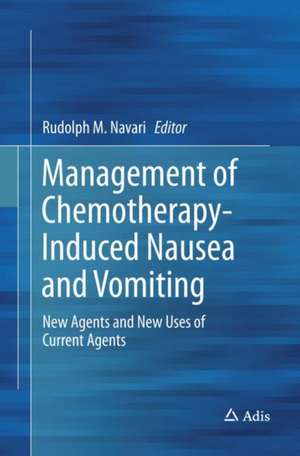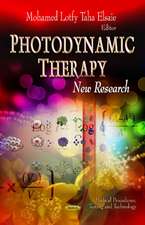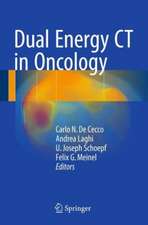Management of Chemotherapy-Induced Nausea and Vomiting: New Agents and New Uses of Current Agents
Editat de Rudolph M. Navarien Limba Engleză Paperback – 29 mar 2018
This book provides a comprehensive review of new agents, a detailed description of new uses of current agents, and an integration of the available agents in clinical practice. A description of a detailed clinical approach provides clinical practitioners with the most up-to-date recommendations for the prevention and treatment of chemotherapy-induced nausea and vomiting (CINV) in various clinical settings.
CINV is one of the most feared treatment related toxicities. Patient surveys for the past thirty years consistently demonstrate patients’ perception of deterioration in quality of life due to chemotherapy treatments. The introduction of the antiemetics, serotonin 5-HT3 receptor antagonists and the neurokinin-1 receptor antagonists, have improved the control of chemotherapy-induced emesis, but the treatment of chemotherapy-induced nausea remains a significant clinical problem. Patients continue to have quality of life issues which prevent normal functioning during active treatment. New agents such as the second generation 5-HT3 receptor antagonist palonosetron and the new neuroknin-1 receptor antagonists rolapitant and netupitant are being introduced into clinical practice, and it is anticipated that these new agents will improve the control of CINV. Agents such as olanzapine (a FDA approved anti-psychotic), gabapentin (a FDA approved neuroleptic), and ginger (a food additive), which have been used primarily for other indications, are now being tested as potential, effective antiemetics.
This work represents the first available comprehensive summary that details all new antiemetic agents and, particularly, their clinical role in treating patients; an important reference for practitioners seeking to improve the quality of life of patients undergoing chemotherapy.
Toate formatele și edițiile
| Toate formatele și edițiile | Preț | Express |
|---|---|---|
| Paperback (1) | 345.20 lei 38-44 zile | |
| Springer International Publishing – 29 mar 2018 | 345.20 lei 38-44 zile | |
| Hardback (1) | 372.76 lei 3-5 săpt. | |
| Springer International Publishing – 31 ian 2016 | 372.76 lei 3-5 săpt. |
Preț: 345.20 lei
Preț vechi: 363.36 lei
-5% Nou
Puncte Express: 518
Preț estimativ în valută:
66.06€ • 69.28$ • 54.99£
66.06€ • 69.28$ • 54.99£
Carte tipărită la comandă
Livrare economică 29 martie-04 aprilie
Preluare comenzi: 021 569.72.76
Specificații
ISBN-13: 9783319800585
ISBN-10: 3319800582
Pagini: 181
Ilustrații: VIII, 181 p. 17 illus., 8 illus. in color.
Dimensiuni: 155 x 235 mm
Greutate: 0.45 kg
Ediția:Softcover reprint of the original 1st ed. 2016
Editura: Springer International Publishing
Colecția Adis
Locul publicării:Cham, Switzerland
ISBN-10: 3319800582
Pagini: 181
Ilustrații: VIII, 181 p. 17 illus., 8 illus. in color.
Dimensiuni: 155 x 235 mm
Greutate: 0.45 kg
Ediția:Softcover reprint of the original 1st ed. 2016
Editura: Springer International Publishing
Colecția Adis
Locul publicării:Cham, Switzerland
Cuprins
1. Introduction.- 2. The Physiology and Pharmacology of Nausea and VomitingInduced by Anti-Cancer Chemotherapy in Humans.- 3. First Generation 5HT-3Receptor Antagonists.- 4. Second Generation Serotonin (5-HT3) ReceptorAntagonist Palonosetron.- 5. The Role of Neurokinin-1 Receptor Antagonists inCINV.- 6. Olanzapine for the prevention of Chemotherapy-Induced Nausea and Vomiting.-7. Gabapentin for the Prevention of CINV.- 8. Prevention of CINV in Patients ReceivingHigh-Dose Multiple-Day Chemotherapy.- 9. Clinical Management of CINV.- 10. Treatmentof Chemotherapy-Induced Nausea.- 11. Conclusions.- 12. Future Directions.
Notă biografică
Dr. Navari received the Ph.D. degree at the University ofVirginia, and the M.D. degree at the Medical College of Virginia. Hereceived training in internal medicine at the University of Alabama inBirmingham, and was a Fellow in Hematology and Oncology at the Fred HutchinsonCancer Research Center, University of Washington School of Medicine. Heis board certified in internal medicine and medical oncology. From 1983to 1998, he served on the Clinical Faculty of the University of AlabamaBirmingham and was a practicing medical oncologist in the Simon-WilliamsonClinic. During this time, he was Chairman of the Department of Medicineand President of the Simon-Williamson Clinic, Director of the Bone MarrowTransplantation Program and Director of the Comprehensive Cancer Program atBaptist Medical Center. In 1997, he was elected a Fellow of the AmericanCollege of Physicians. During 1998-99, he was a Fellow in ClinicalMedical Ethics in the MacLean Center for Clinical Medical Ethics at theUniversity of Chicago. He joined the faculty of the College of Science ofthe University of Notre Dame (UND) in 1999 as Director of the Walther CancerResearch Center. He was appointed Associate Dean, College of Science, in 2000.In July, 2005, he became Professor of Medicine, Assistant Dean and Director,Indiana University School of Medicine South Bend (IUSM SB), and Adjunct Professorof Biochemistry, University of Notre Dame. In 2011, he was appointed ClinicalDirector, Harper Cancer Research Institute, a partnership between IUSM SB andUND. He was promoted to Associate Dean in 2012. Along with the medical studentsat IUSM SB, he founded the IUSM SB Student Outreach Clinic in 2013 and wasappointed the Clinic’s first Medical Director.In 2014, he joined the World Health Organization as Directorof the Cancer Care Program, Eastern Europe. In 2015, he was appointed Directorof the Cancer Care Program, Central and South America.
Dr. Navari's research interests include supportive care inclinical oncology, development of antiemetics, palliative care, and thedoctor-patient relationship in clinical oncology. He has published overone hundred and thirty peer reviewed articles, with the most recent dealingwith supportive care issues in clinical oncology.
Textul de pe ultima copertă
This book provides a comprehensive review of new agents, a detailed description of new uses of current agents, and an integration of the available agents in clinical practice. A description of a detailed clinical approach provides clinical practitioners with the most up-to-date recommendations for the prevention and treatment of chemotherapy-induced nausea and vomiting (CINV) in various clinical settings.
Caracteristici
Provides a comprehensive review of the new agents for treatment of chemotherapy-induced nausea and vomiting
Provides a detailed description of new uses of current agents for treatment of chemotherapy-induced nausea and vomiting
Discusses an integration of the available agents for treatment of chemotherapy-induced nausea and vomiting in clinical practice
Provides a detailed description of new uses of current agents for treatment of chemotherapy-induced nausea and vomiting
Discusses an integration of the available agents for treatment of chemotherapy-induced nausea and vomiting in clinical practice








